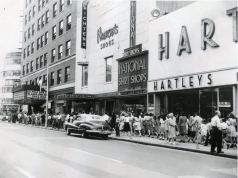During the past two years, Black-owned businesses have most strongly felt the economic consequences of the pandemic. According to a Committee on Small Businesses report, between February and April of 2020, Black business ownership declined by 40%.
A poll in October 2020 reported only 40% of Black business owners expected their enterprises to last longer than six months. One of D.C.’s iconic Black-owned businesses may be a bellwether.
Ben’s Chili Bowl, a neighborhood staple in Washington, D.C.’s U Street corridor, attracts everyone from D.C. natives to politicians to celebrities. Ben and Virginia Ali established the restaurant in 1958 and have served the likes of Dr. Martin Luther King Jr., Barack Obama, Elvis Presley and many others over the years.
Virginia Ali, one of the owners and founders, says the place prides itself on making you feel at home the minute you walk through the doors.
Ali, who is 88 years old, has watched D.C. and its U Street Corridor change over the years. She and Ben, who is from Trinidad, opened the restaurant after he had an accident that left him unable to complete the dental program in which he was studying. Ben had had experience working in restaurants to pay for college and a chili recipe. The two opened the restaurant within walking distance of Howard University in an area formerly known as Black Broadway.
Ben died a few years ago, but she remembered the place’s storied past while sitting at a table in the crowded, noisy place. She participated in the famous March on Washington in 1963 and met Dr. King. The restaurant soon became a meeting place for civil rights leaders. Its first test of survival came on April 4, 1968.
“Someone walks in the door one evening and says Dr. King has been assassinated,” Ali recalled. “No way. We don’t believe that. People were sobbing.”
She witnessed the riots that followed his assassination.
“My husband wrote on the window ‘soul brother,'” said Ali. “The mayor put a curfew for three nights. We were the only place that was allowed to stay open during those three nights of curfew.”
After surviving the turmoil of the riots and later thriving, an invisible virus threatened to shut down the iconic establishment for good when tourism came to a halt and regulars stayed home.
After NPR, the Washington Post and others reported Ben’s was struggling, donations soon followed.
“I started getting these letters from patrons from the community, around the city, out of town, everywhere,” said Ali. “They said, ‘Please Mrs. Ali, I love Ben’s Chili Bowl, please take this little check of $100.”
She says donations ranged from $25 to $1,000. The restaurant used some of the donations to prepare boxed lunches for more than 5,000 people, including the medical staff at nearby Howard University Hospital, the police department, and the fire department.
Two years into the pandemic, Ben’s is still not what it used to be. There is space to sit down in the restaurant’s dining rooms. Profits are smaller.
“Because of our history and our resilience, we were able to hang on,” said Ali.
Another business that has struggled in the U Street Corridor is a bookstore opened by two entrepreneurs called A Tree Grows at BookPlace.
Kim Wallace describes herself and her partner Kwasi A-Jalil Fry as bibliophiles. She spent her childhood in libraries, and her love of books continued into adulthood.
“I decided that I wanted to open a bookstore at some point,” says Wallace. “We have evolved into developing ourselves as two things: one, a research library where folks can come and spend time in the personal collection to delve more deeply into the subject of African-American history and culture. Two is we offer project-based learning to every demographic from preschool all the way to seniors. They all focus on some aspect of the literary experience.”
The bookstore launched before the onset of the pandemic, and health restrictions forced them to be creative in their business model.
“Being baby boomers, which I’m proud to be, we did not pivot well in terms of applying the social media aspect,” said Wallace. “But we were able to develop a very loyal customer base who could be in contact with us to inquire about books they were interested in.”
They were forced to close for more than a year but allowed back to in-person selling in August 2021. Wallace says that things have significantly improved since then. Some of that sales have been in street markets.
“It has been incredible,” said Wallace. “We have expanded to four markets: 14th and U Street; 14th and Park Road, which is a Saturday market; Congress Heights in Southeast Washington D.C., which is another Saturday market; and also on the campus of Howard University.”
She says she’s optimistic about expanding her business despite its rocky start. The store has gained a larger customer base and has become more digitized in how it provides services. Customers will eventually shop on the store’s website and read Wallace’s blog posts on various topics.
“Just want to shine the profundity of our experience as Black people,” said Wallace.































